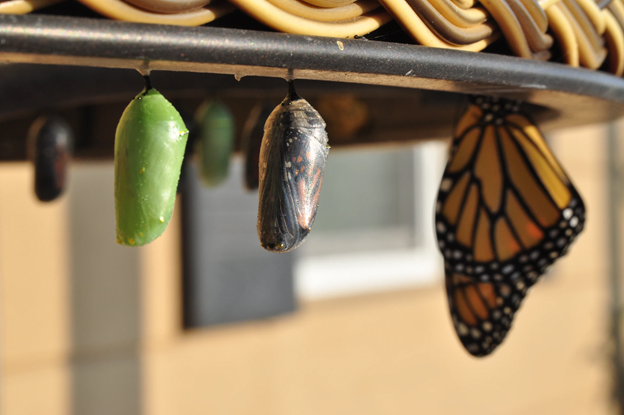Motivation
Personal Transformation Is a Continual Process
Are you the same version of you?
Posted August 31, 2021 Reviewed by Chloe Williams
Key points
- Personal transformation occurs when people push through obstacles.
- A positive outlook, a growth mindset, and introspection are all essential in helping people become stronger and better versions of themselves.
- As people's identities transform, their personal observations and external environment influence how they evolve.

A man found a cocoon of a butterfly, and one day, a small opening appeared. He sat and watched the butterfly for hours as it struggled to squeeze through the tiny hole. Then it stopped, as if it could go no further.
The man decided to help the butterfly. He took a pair of scissors and snipped off the remaining bits of cocoon. The butterfly emerged easily, but it had a swollen body and shriveled wings. The man continued to watch, expecting it to fly at any moment.
But, in fact, the butterfly spent the rest of its life crawling around, unable to fly. In his kindness and haste, the man didn’t understand that the restricting cocoon was a way of forcing the fluid from the butterfly’s body to its wings so it would be ready for flight.
Written by an unknown author, this powerful story illustrates that sometimes struggles are exactly what we need in our lives. Personal transformation occurs when we’ve pushed through obstacles that stand in our way. Being a high achiever comes with a host of pressures and challenges, and just like for anyone, conquering those struggles make us stronger.
Personal transformation is a continual process, and as difficult as our struggles may be, they help us evolve in several significant ways.
Personal Transformation Results in New Versions of Yourself
The broader concept of personal transformation is multi-dimensional and results in a new version of yourself each time you transform. As you move through life and its various phases of experience, there are periods of stability when you are living the life that you have created. Stable periods are followed by transition periods when decisions or circumstances drive you to a new way of being in one or more dimensions.
Depending on how you engage within this process, your physical, emotional, cognitive, and behavioral responses can mold you in various ways. You may adapt to new ideas, accomplish unexpected goals, learn new ways of measuring success, and understand yourself more deeply. A positive outlook, a growth mindset, and introspection are all essential in helping you become a stronger and better version of yourself as you transform.
When I first entered medical school, the process of transforming into a physician began at the very outset. I was surrounded by peers who were pursuing the same profession with an inclusion that cultivated belonging. As I progressed through the curriculum and many new experiences, I achieved my goals with a passion to care for others. I could see the impact of my efforts in patients I managed, and their positive outcomes were meaningful and rewarding.
The challenges I faced helped me learn to give myself permission to make mistakes, to be kind when setting expectations for myself, and to maintain a mindset that was focused on growth. On a practical level, I developed a habit of prioritizing and tracking my goals each day, making work feel more manageable and consistently productive. I learned relaxation techniques and consciously applied time management strategies to include opportunities for mindfulness and active reflection.
The overall process increased my mental toughness and ability to persevere. Just like the butterfly, each obstacle helped me transform and made me stronger.
What Will the Next Version of Yourself Be?
Transformation is a continual process. With the many influences that shape you—childhood upbringing, cultural upbringing, role models, and other social experiences—what roots you as you transform?
In answering this question, the concept of nature versus nurture is an interesting consideration. While there is agreement that both genetic factors and environmental influences contribute to behavior and development, the relative contribution of each factor remains unclear. External influences are thought to enhance predisposed traits towards developing a superiority complex, for example, or an inferiority complex on the opposite extreme.
In the high-pressure, high-stakes, and time-sensitive circumstances we routinely face in demanding professions, how do you maintain yourself in a healthy balance? How do you convey confidence and skill as a doctor, as an example, while maintaining a genuine sense of humility and compassion? And regardless of what your innate behavior or personality tendency may be?
Since the beginning of my journey in medicine, my philosophy has been to treat every patient how I would want my own family member to be treated, no matter what the circumstance, no matter how pleasant or unpleasant the patient. In more difficult moments, I manage the situation appropriately, and in a manner that remains calm and respectful. My approach holds true for all of my interactions and is rooted in the values with which I was raised. These roots have only grown deeper and more powerful over time.
Continue Your Evolution
As your identity transforms in any situation, your personal observations and external environment influence how you evolve. Having a positive outlook, growth mindset, and introspection are essential in transforming you into better versions of yourself. Like the butterfly, conquering your struggles helps make you stronger.
That doesn’t mean you have to struggle in silence or radically change who you are. It simply means reflecting on how you identify with your role as a professional, how you’re transforming professionally and personally, what influences are contributing to your transformation, and how you hope to transform in the future.
High achievers are often seen as role models and leaders. When you are an emotionally intelligent leader who has gone (and continues to go) through a process of personal transformation, you have the potential to make a positive impact on all the people around you.
Copyright Dr. Nina Ahuja, MD




